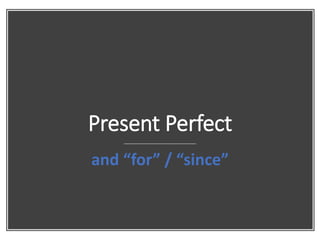
Present Perfect Tense Guide - Uses, Forming, Questions & "For" vs "Since
- 1. Present Perfect and “for” / “since”
- 2. The Present Perfect Tense The present perfect tense is common in English. It is used for many different functions. This presentation will explain the rules for forming the tense with regular and irregular verbs. Forming the present perfect tense This tense is formed using two components: the auxiliary HAVE (in the present tense), and the past participle form of a verb. With a regular verb the past participle ends with -ED (just like the simple past). Irregular verbs have a special past participle form that you have to learn. Here are some examples: I have been to Moscow. You have finished the exercise. He has just gone home. She has already had a holiday this year. It has broken! We have seen this film before. They have bought a new car.
- 3. Present Perfect - Negative Sentences I haven't been abroad yet. You haven't answered my question. He hasn't been home for five years. She hasn't found a new job. It hasn't finished yet. We haven't worked on a farm. They haven't seen each other for ages.
- 4. Present Perfect – YES/NO Questions Have you been to the cinema recently? Yes, I have. No, I haven’t. Has he worked here long? Yes, he has. No, he hasn’t. Has she already sent the fax? Yes, she has. No, she hasn’t Has it ever been in a crash? Yes, it has. No, it hasn’t. Have we done it right? Yes, you have. No, you haven’t. Have they gone home yet? Yes, they have. No, they haven’t.
- 5. Present Perfect – Information Questions What have I done? How long have you been here? How many times has he been married? What countries has she visited? Where has it been? How long have we been together? Where have they worked?
- 6. PRESENT PERFECT As it was mentioned before, the present perfect tense is used for many different functions. Some of its most important uses are… Use 1: Actions which started in the past and are still continuing The present perfect is often used for an action which started at some time in the past and are still continuing now. Often, the words for (with a length of time) and since (with a starting time) are used along with the present perfect. • He has lived in Canada for five years. (He started living in Canada five years ago, and he's still living there now.) She has worked at the University since 1994. (She started working at the University in 1994, and she's still working there now.)
- 7. Use 2: Actions which happened at some unknown time in the past Sometimes, it's important to say that something happened (or didn't happen), but it's not important (or not known) when it happened. In this case, we can use the present perfect too. In this case, we often use the words already, yet, ever or never along with the present perfect. These words usually go before the past participle in the sentence. I've already seen that film. I don't want to see it again. (It doesn't matter when I saw it.) Have you ever been to Germany? (It doesn't matter when you went -- I just want to know whether you have been there or not.)
- 8. Use 3: Repeated actions at unspecified times in the past This use is similar to the previous one: it's important to say that something happened (or didn't happen), but it's not important (or not known) when it happened. In this case, the most important thing is that the action has happened several (repeated) times. I've already seen that movie three times. (It doesn't matter when I saw it. The important thing is how many times I saw it. She’s been to Disneyworld two times already. (It doesn't matter when she went. Here what matters is the fact that she’s been there more than once.
- 9. Use 4: Actions which happened in the past, but have an effect in the present This use is a little more difficult than the other two. In this case, the action happened at some time in the past, but the effect of the action is still important now. It's easier to understand this use if we compare present perfect sentences with simple past sentences. Tense Sentence Meaning Present Perfect I've lost my keys. I haven't found the keys yet -- they're still missing. Simple Past I lost my keys yesterday. I've probably found them again already. Present Perfect She's broken her arm. The arm is still injured. Simple Past She broke her arm. The arm is probably OK by now.
- 10. FOR and SINCE I have been afraid of spiders since I I was five years old. I have had this phobia for many years. • Am I afraid of spiders now? • When did I start being afraid of spiders? • How long has it been a phobia? • When do we use for and since?
- 11. FOR and SINCE We often use for and since when talking about time. • for + period: a "period" is a duration of time - five minutes, two weeks, six years. For means "from the beginning of the period to the end of the period". • since + point: a "point" is a precise moment in time - 9 o'clock, 1st January, Monday. Since means "from a point in the past until now".